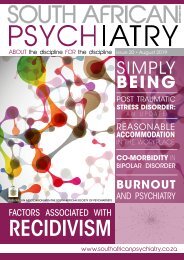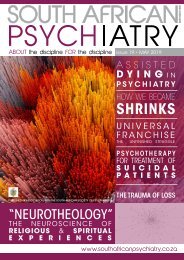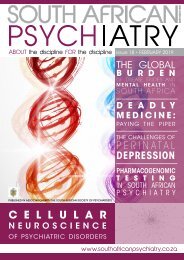South African Psychiatry - November 2018
South African Psychiatry - November 2018
South African Psychiatry - November 2018
You also want an ePaper? Increase the reach of your titles
YUMPU automatically turns print PDFs into web optimized ePapers that Google loves.
SASOP<br />
SOUTH AFRICAN SOCIETY OF<br />
PSYCHIATRISTS<br />
equal access to quality care for all <strong>South</strong> <strong>African</strong>s<br />
and hopes that Universal Health Coverage (UHC)<br />
will include people with serious mental illness and/<br />
or psychosocial and intellectual disability in equity<br />
with others. To this end, we are fully supportive of the<br />
inclusion of mental health care already evident in<br />
the NDOH Essential Medicines List and Standard<br />
Treatment Guidelines. 1 Regarding the NHI Bill, we are<br />
pleased to note that, in Section 54(2)(b)(iv), mental<br />
health disorders and people with disabilities are<br />
included as a vulnerable population group requiring<br />
an “interim purchasing of health care services.”<br />
However, we are still concerned that mental health<br />
is not recognised in parity with general health by the<br />
Bill. This concern is derived from the following:<br />
• Mental health is only recognised in parity with<br />
general health in the preamble in relation to<br />
Article 12 of the United Nations Covenant on<br />
Economic, Social and Cultural Rights, 1966 and<br />
Article 16 of the <strong>African</strong> Charter on Human and<br />
People’s Rights, 1981. There is no other mention<br />
of the needs of people with mental illness or<br />
intellectual disability until Section 54, where<br />
they are mentioned only in the context of a<br />
vulnerable population group.<br />
• The Bill does not acknowledge the United<br />
Nations Convention on the Rights of Persons<br />
with Disabilities and Optional Protocol (CRPD),<br />
which came into force in 2008, 2 and to which<br />
<strong>South</strong> Africa is signatory.<br />
• The Bill does not acknowledge the Mental<br />
Health Care Act No.17 of 2002 (MHCA) other<br />
than as a piece of legislation which will require<br />
amendment for NHI. The MHCA differs from the<br />
other health-related legislation listed in that it<br />
regulates mental health care services, which<br />
should be funded by NHI in parity with all other<br />
health care services. Although the MHCA is to<br />
be amended for the purposes of NHI, it must still<br />
be observed by NHI, as is the National Health<br />
Act No.61 of 2003 (NHA), which also requires<br />
amendment.<br />
• These omissions (the term “mental health”, the<br />
CRPD, acknowledgment of the MHCA) imply that<br />
mental health, and the care of PLWMI &/or ID,<br />
may not be funded equitably under NHI. While<br />
one does not want to emphasise a separation<br />
between “mental health” and “health,” it is<br />
necessary to have an inclusive definition in the<br />
Act to ensure that anything that applies to any<br />
area of health also applies to mental health.<br />
Such a definition would be consistent with the<br />
CRPD and the Sustainable Development Goals<br />
(SDGs), which include mental health in parity<br />
with general health in the “Declaration” and in<br />
health goal 3.<br />
In addition, the health service should address the<br />
needs of all people for all types of illness according<br />
to disease burden, with necessary adjustments<br />
made to the health system to accommodate all<br />
disabilities.<br />
Therefore, we recommend the following alterations<br />
to the Bill:<br />
• Definitions<br />
‘Health’ to be defined in a manner which<br />
ensures mental health is included in parity<br />
with physical health, such as in the World<br />
Health Organisation (WHO) definition of<br />
health as a “State of complete physical,<br />
mental, and social wellbeing, and not merely<br />
the absence of disease or infirmity”, would be<br />
an example.<br />
‘Comprehensive Health Services’, to be<br />
defined as by the WHO, as “health services<br />
that are managed so as to ensure that people<br />
receive a continuum of health promotion,<br />
disease prevention, diagnosis, treatment and<br />
management, rehabilitation and palliative<br />
care services, through the different levels and<br />
sites of care within the health system, and<br />
according to their needs throughout the life<br />
course.”<br />
• Application of the Fund<br />
Section 2(1) – to include “non-profit health<br />
establishments”, as in the definition of health<br />
establishment in Section 1 of the NHA. Nonprofit<br />
health establishments are essential for<br />
comprehensive health care services, including<br />
those which are within the community.<br />
1<br />
NATIONAL DEPARTMENT OF HEALTH. <strong>2018</strong>. Standard Treatment Guidelines and Essential Medicines List [Online].<br />
Pretoria, Republic of <strong>South</strong> Africa. Available: http://www.health.gov.za/index.php/standard-treatmentguidelines-and-essential-medicines-list<br />
[Accessed 16 September <strong>2018</strong>].<br />
2<br />
UN Convention on the Rights of Persons with Disabilities and Optional Protocol, available from http://www.<br />
un.org/disabilities/documents/convention/convoptprot-e.pdf [accessed 13 September <strong>2018</strong>]<br />
74 * SOUTH AFRICAN PSYCHIATRY ISSUE 17 <strong>2018</strong>

















